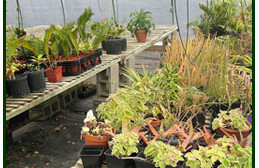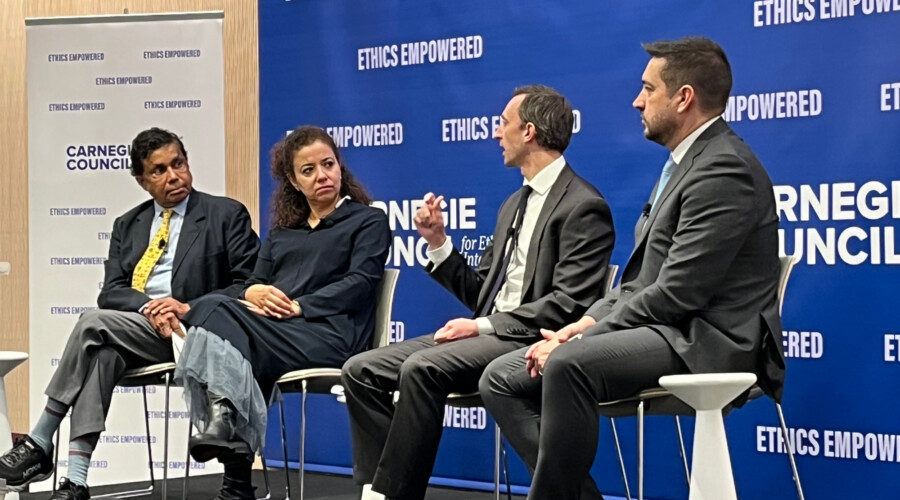Jacqueline Dufalla, age 17, is a senior at the Ellis School in Pittsburgh, PA.
Essay Question: How would you improve your school so that it prepares future leaders to protect the planet?
It is too easy to feel pessimistic about the future of Earth. Whether pelted
with images of a stranded polar bear on a melting ice cap or the oil spill in
the Gulf, students, parents, teachers, and citizens alike are often susceptible
to an ever-present feeling of doom about the future planet and generation. However,
power to change this predicted gloomy future coincides with the power of education
and knowledge. By changing our educational system to encourage cooperation between
the environment, businesses, and society, there will be tremendous and encouraging
opportunities for the future leaders of our planet.
At the Ellis School, we have recently instituted a comprehensive recycling and
compost program. We also began to use silverware instead of plastic utensils.
Our lights are mainly fluorescent and energy efficient. However, despite these
initiatives, students are still startlingly unaware of the final destination
and the origins of their waste. Students at Ellis had an Environmental Day last
year where they explored various areas, such as a garbage dump, an organic farm,
and Alcosan, the Alleghany County sewage treatment plant. Despite the informative
nature of the field trips, it hardly scratched the surface of understanding
in the mind of an urban school student. Without a more profound and long-lasting
impact from the visit, many students forgot about the true message and instead
joked about the more olfactory parts of the day. If students do not realize
where their compost, plates, cups, and other garbage ends up, they will do nothing
to attempt to reduce or reuse, which are the preferred conservation techniques
over recycling. A teacher who understands the dynamics of the student body and
can better relate and inform students would be a great addition to the tour
guide. Many students find tour guides too serious, too knowledgeable, or too
quiet.
Additionally, site pictures from the field trips should become posters
and placed around the school. They would act as a reminder to students about
the beginning and end of their waste. Most importantly, students should be given
a way to notice their contribution. For instance, if the Ellis students visit
a recycling plant, they should then see how many recyclables they send to the
plant and attempt to increase the amount for next year. They could then revisit
the recycling plant later and physically see their contribution. Nothing is
as resonating in a young mind than a real-life example.
Thus, the presence of
a partially guiding faculty member for field trips, as well as a continuing
connection to a facility, and a real-life example of one's impact on the environment
would all assist in the education of future leaders of the world.
The Ellis School, and hopefully other educational facilities, could also begin
a "Day without Power." This day would restrict students' use of electrical power,
such as their laptops and phones, and classes would instead use natural light.
Students from the Ellis chapter of Students for a Greener Pittsburgh Club would
also give a presentation that would describe the obvious need for electricity
in everyday life and encourage students to reflect upon 'green' fuel alternatives.
A possible field trip at the end of the day to an electrical plant would summarize
the day.
This day would act as a physical demonstration to students about the
rising necessity of a more sustainable energy source while also pragmatically
showing the unarguable need for electricity. This event would display the financial
qualms about different energy sources through the lessening of Ellis's electrical
bill for the day. The presentation would also touch upon the fiscal aspect of
'green' alternatives. By involving the entire Ellis community during the day
and encouraging students to discuss their feelings towards this dilemma, different
aspects of society would be shown as well. The "Day without Power" would further
educate students about the essential balance between the environment, businesses,
and society needed to arrive at a successful future.
In addition to field trips that are more instructive and a "Day without Power,"
a supplementary elective class would greatly benefit the Ellis School curriculum.
Currently, the Ellis School High School does not offer any course on specific
environmental issues. The Freshmen are required to take a 'Global Issues' course
which touches on climate issue, but again, it lacks the depth of an entire course
focused on the environment. The biology class has weekly 'Current Events' where
two students bring in news articles about new scientific happenings, yet this
hardly comes close to the necessary intensity that a full course would offer.
With the option of an elective that solely deals with environmental issues,
future leaders would learn how to protect the planet as well as appreciate the
delicate equilibrium of business and society as well.
Classes, field trips, and a special day are all beneficial additions to the
educational prowess of the future generation. However, students often forget
these improvements. Therefore, the Ellis School must build a physical reminder
to students, a greenhouse. This would clearly be advantageous in the science
curriculum, as it would facilitate learning about plants and genetics through
hands-on testing.
It would also allow students to attempt independent experiments,
for either personal knowledge or the Pittsburgh Science Fair. A greenhouse would
also encourage members of the Ellis community to work together in order for
the construction and maintenance of the greenhouse. This collaboration would
create a 'think-tank' of ideas and opinions that would represent all aspects
of society. Through time, the efforts of all members would result in a more
environmentally conscious group. Finally, a club and faculty advisor would work
on the finances of this project. This would involve balancing the assets, creating
fundraisers, and filling out grant forms. Thus, for the more business-oriented
students, they would learn the importance of balancing finances and 'green'
initiatives from an early age.
Lastly, and most importantly, the greenhouse's
location would be a place that is convenient to view and act as a reminder to
students about the positive factors of 'green' projects. The greenhouse would
stand as a tangible reminder unlike a field trip, class, or special day. It
would act as a symbol to students of the benefit of cooperation between positive
ecological practices, businesses, and societal interests.
Robert Heinlein once stated, "By cultivating the beautiful, we scatter
the seeds of heavenly flowers, as by doing good, we cultivate those that belong
to humanity." This quote effectively demonstrates the need to cultivate
the beautiful acts of humanity through wisely educating the next generation.
By having more impactful field trips, experiencing a 'Day without Power', getting
the option of an environmental elective, and installing the physical symbol
and reminder of a greenhouse, the Ellis School will be able to reaffirm the
innate goodness of the world by encouraging young leaders in the ways of cooperation
among the environment, businesses, and society. For that reason, these small
improvements will not only change the face of the "Ellis girl," but
also the face of the planet.
This contest was part of the Council's second annual SEPTEMBER SUSTAINABILITY
MONTH, which kicked off a year of events and resources on sustainability. Generous
funding of the Carnegie Council's 2010-2011 sustainability programming has been
provided by Hewlett-Packard and by Booz & Company.



